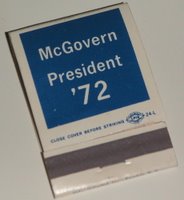McGovernment for the People
 "McGovernment for the People" wasn't an ironic rallying cry made up by liberals to disparage a quick and greasy approach to running our nation. It was a campaign slogan for South Dakota senator George McGovern, the Democrat who lost to Richard Nixon in 1972. He lost bad; the only state to carry him was Massachusetts.
"McGovernment for the People" wasn't an ironic rallying cry made up by liberals to disparage a quick and greasy approach to running our nation. It was a campaign slogan for South Dakota senator George McGovern, the Democrat who lost to Richard Nixon in 1972. He lost bad; the only state to carry him was Massachusetts.A 2005 Washington Post article looking back at the defeat recalled another big loser's reaction:
Barry Goldwater, who had been swamped by Lyndon Johnson in 1964, sent McGovern a newspaper political cartoon depicting the two of them together -- "like Grandpa and Granny [in the painting 'American Gothic'] -- linked by our defeats," McGovern remembers. Goldwater had jotted a note on the cartoon: "George -- If you must lose, lose big."
Back then, the prefix "Mc" wasn't applied to things to connote a low-quality mass appeal or disposability -- like McMansion or McJob ("McJob" made it into the Merriam-Webster dictionary in about 2003 -- McDonald's was not amused.).
In 2001, Naomi Klein used the term "McGovernment" to describe a "happy meal of cutting taxes, privatizing services, liberalizing regulations, busting unions." A near perfect irony, given what George McGovern stood for.
And still stands for. McGovern is out there, even now. He wrote a nice panegyric for Hunter Thompson in the L.A. Times last year. Thompson and McGovern had a strange relationship. Thompson's Fear and Loathing on the Campaign Trail covered the Nixon-McGovern race. Here's part of what McGovern had to say about Thompson:
As the candidate who lost 49 states to Richard Nixon in the 1972 presidential election, I have always been pleased that among the precious few who thought I would have made the better president was Hunter S. Thompson, who went to his untimely grave saying that I was "the best of a lousy lot."
Thompson's position was that I was "honest"--except for one "wicked moment" when I attended Nixon's funeral and said a few sympathetic words to his family and friends. "Yeah," Hunter told me, "you went into the tank with that evil bastard."
Hunter relished such frightful words. "Evil," "wicked," "fear and loathing." These were the words that described the world best for him.
Once, when he was pressed into the back seat of my car with three other people, he tried to escape to a nearby bar when I slowed for a red light in heavy traffic. Foiled by the baby lock that had been inadvertently clicked on, he raged at me: "Get me out of this evil contraption before I start killing."
On the jacket of his now-classic book about the 1972 election, "Fear and Loathing on the Campaign Trail," he printed a photograph of the two of us with the following caption: "Pictured above is George McGovern urging Dr. Hunter S. Thompson to accept the vice presidential nomination."
 I got my little "McGovernment for the People" matchbook at a flea market last weekend for $9 -- a small price to pay for such an odd piece of American history.
I got my little "McGovernment for the People" matchbook at a flea market last weekend for $9 -- a small price to pay for such an odd piece of American history.


0 Comments:
Post a Comment
<< Home